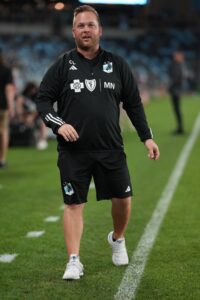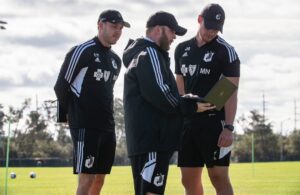
Craig Lane grew up on the blue turf, as his father works as the director of equipment operations. Lane spent his youth as a ball boy and states “Boise State runs in my blood, it’s what I grew up with and what I grew up around. People knew me as a Boise State kid.”
Lane knew he didn’t want to be in a cubicle but rather be active in sports. Boise State helped him do that. Lane snagged an internship with strength and conditioning as a sophomore at Boise State, graduating in 2014 with a major in exercise science and fitness. Lane noticed that technology was becoming a better resource for sports and made the transition from strength and conditioning to sports science, learning how to code and work with statistics.
Now Lane is returning to Boise State to teach “Introduction to Sport Science,” so undergraduate students in kinesiology can learn about and appreciate all the necessary components of applied sport science. Lane calls it a “growing movement,” especially for western culture.

Lane has done a lot since graduating from Boise State. He spent time as a strength coach in Seattle for three and half years working for the Everett Silvertips, part of the Western Hockey League. During this time, Lane helped 13 players as they were drafted into the NHL during this time. Due to the COVID-19 pandemic, Lane had to return home. However, this didn’t hold him down, Lane ended up in Phoenix next, working as a Sports Scientist with the Phoenix Rising for two seasons. Next, Lane worked as the Lead Sports Scientist for two seasons for Minnesota United in Major League Soccer. Lane has spoken at multiple clinics, world wide, surrounding the topic of strength conditioning, performance and recovery, including Oregon State, New Brunswick Provincial Clinic, and the Nova Scotia Provincial Clinic. Lane is currently an Executive Council Member for the National Strength and Conditioning Association’s Hockey Special Interest Group.
While spending time in other countries, Lane noticed that many teams, if not all, have a specified sports scientist to ensure the health, well-being, recovery and performance of athletes, with an emphasis on their health first and foremost. Lane discusses that while you cannot predict everything in the realm of sports, you can use analyzed sports data to help trainers, doctors and physical therapists understand what they are seeing and create insight based off of that to better aid athletes.
Due to his experience working with teams, coaches and managers, Lane will make an excellent teacher as he learned how to communicate and articulate this data with all sorts of people of all ages and backgrounds. Lane mentions the pride he feels in “seeing that moment, whatever tiny part I played, to know that I helped them achieve their dream”
What excites Lane the most is to see what the response is from the students, hoping to build the university into a major influence, emphasizing a real opportunity to make Boise State a name in the sports science world. Lane states that “nothing west of the Rockies has this kind of program, to be able to develop sports science into its own major”